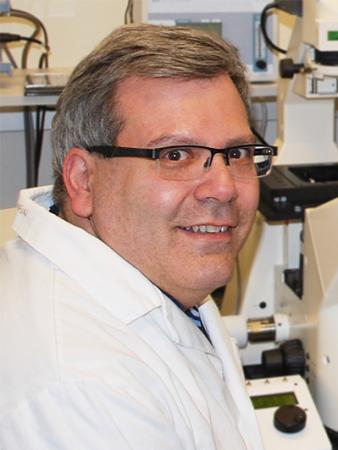Phil Santangelo has been promoted to full professor effective August 15, 2019.
Research in Phil Santangelo’s lab is primarily focused on three areas: native RNA regulation, RNA virus pathogenesis, and RNA therapeutics and vaccines, where the application and development of imaging technology is applied to all three areas.
To address RNA regulation, localization and dynamics in the cellular milieu, his lab developed single molecule sensitive approaches for imaging native RNAs and RNA dynamics in live cells, as well as the first assay to detect native RNA-protein interactions in situ. To date, the results of these methods have been applied to the cell biology of human respiratory syncytial virus infections and RNA regulation during tumorigenesis.
His lab’s methods and their results have been published in high impact journals such as Nature Methods, Nature Nanotechnology, ACS Nano, Traffic, Journal of Virology, Nucleic Acids Research, and Journal of Biological Chemistry. These methods are also being used to interrogate and develop RNA-based therapeutics and vaccines.
In addition he has been developing whole-body, PET/CT imaging tools for interrogating SIV infections within the macaque model. The purpose of this tool is to answer fundamental questions regarding the location of residual virus during treatment, in the hope of learning vital information that could be applied to approaches seeking to “cure” SIV or HIV.
Media Contact
Walter Rich
Keywords
Latest BME News
Jo honored for his impact on science and mentorship
The department rises to the top in biomedical engineering programs for undergraduate education.
Commercialization program in Coulter BME announces project teams who will receive support to get their research to market.
Courses in the Wallace H. Coulter Department of Biomedical Engineering are being reformatted to incorporate AI and machine learning so students are prepared for a data-driven biotech sector.
Influenced by her mother's journey in engineering, Sriya Surapaneni hopes to inspire other young women in the field.
Coulter BME Professor Earns Tenure, Eyes Future of Innovation in Health and Medicine
The grant will fund the development of cutting-edge technology that could detect colorectal cancer through a simple breath test
The surgical support device landed Coulter BME its 4th consecutive win for the College of Engineering competition.








